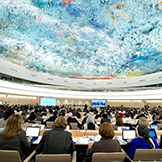Interactive Dialogue on Truth, Justice, Reparations and Freedom of Religion and Belief
Clustered Interactive Dialogue with the Special Rapporteur on Truth, Justice, Reparations and Guarantees of Non-recurrence and the Special Rapporteur on freedom of religion and belief
Statement of Ireland
7 March 2017
Ireland aligns with the statement of the European Union and adds the following.
Mr President,
Ireland warmly welcomes both the Special Rapporteur on Truth, Justice, Reparations and Guarantees of Non-recurrence and the Special Rapporteur on Freedom of Religion and Belief. We thank both for their reports and presentations.
We will today address our remarks to Special Rapporteur de Greiff.
Ireland acknowledges the work of the Special Rapporteur in his role, in particular his contribution to the ongoing efforts to build genuine reconciliation in Northern Ireland.
We share the Special Rapporteur’s recognition that progress has been made in Northern Ireland, particularly on guarantees of non-recurrence. Notwithstanding this progress, there are outstanding challenges which must be addressed if Northern Ireland is to be truly at peace, in particular and, as the Special Rapporteur highlights, the need to make progress on dealing with legacy issues.
In the Stormont House Agreement in 2014, the British and Irish Governments, together with the main political parties in Northern Ireland agreed a comprehensive set of institutions intended to deal more effectively with the past. Ireland considers that the establishment of these institutions offers the best way to bring whatever healing is possible to victims and survivors, who have waited too long for access to truth and justice. It would also alleviate the burden which the past imposes on politics and the police and justice system in Northern Ireland, allowing the promise of peace to be realised.
Ireland continues to urge the Government of the United Kingdom, the Northern Ireland political parties and all stakeholders to find a way forward in establishing the legacy institutions. The few but significant outstanding issues must be resolved, so that the institutional framework on the past can be legislated for as early as possible. The Government of Ireland has committed the full cooperation of the relevant Irish bodies with these institutions.
Ireland agrees that the issue of pensions for seriously injured victims needs resolution: the Good Friday Agreement makes specific reference to both services and resourcing for victims. We urge those with responsibilities in this area to progress a pension for victims without delay.
Ireland welcomes the recommendation of the Special Rapporteur that the proposals made by the Lord Chief Justice of Northern Ireland to improve the efficacy of inquests should be supported. Many families have been waiting decades for this legal remedy to be concluded. These inquests can offer a critical avenue through which families may seek to finally establish the record of the deaths of their loved ones, most of whom have had to bear their loss for decades now without answers.
Finally, Ireland welcomes the recommendation of the Special Rapporteur that re-engagement on the outstanding aspects of the Good Friday Agreement, including a Bill of rights for Northern Ireland, should resume.
We would be interested to hear from the Special Rapporteur how he envisages the future work of the mandate might contribute to taking this forward?
Thank you

